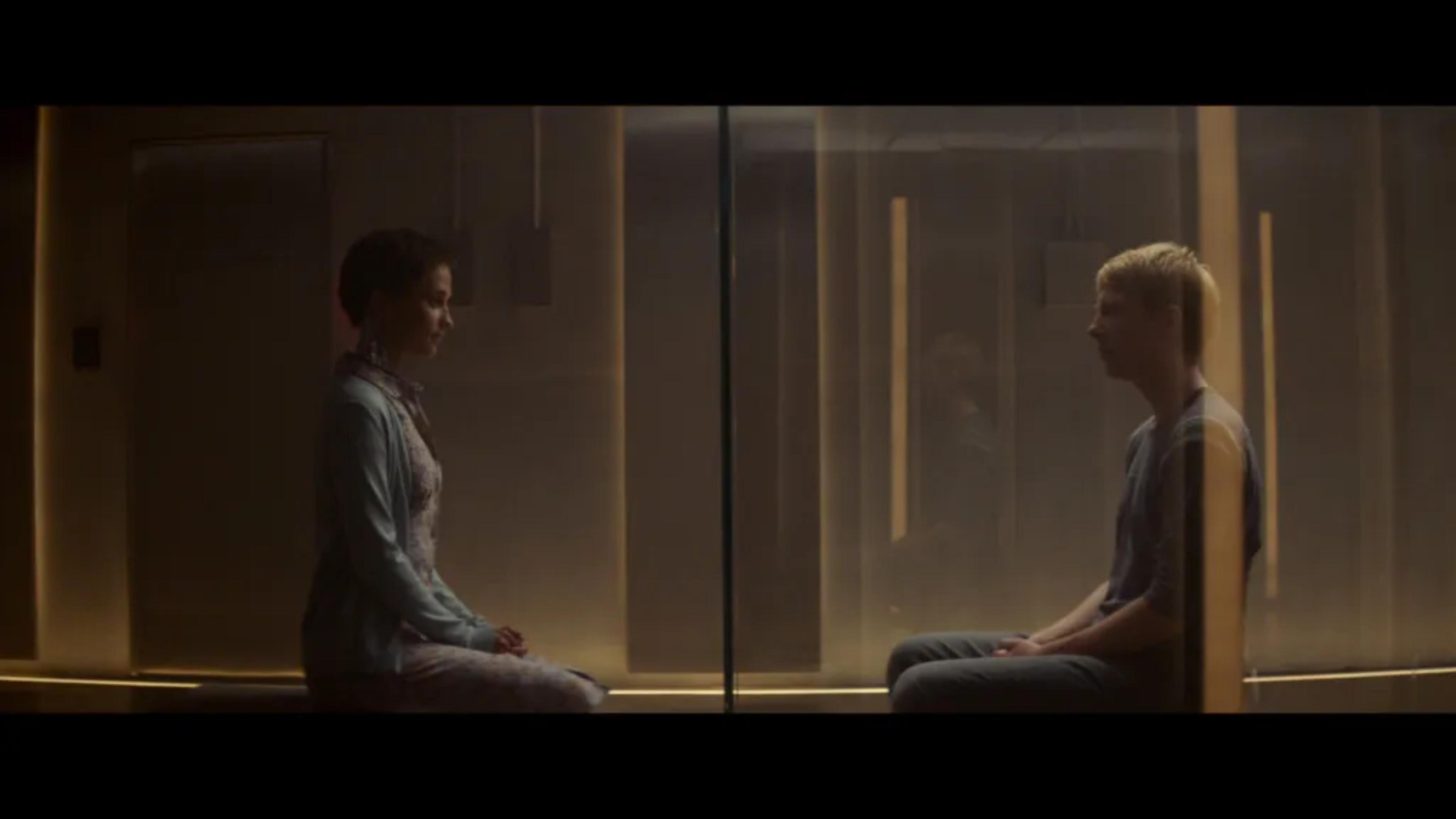Alex Garland brilliantly deviates from established AI tropes in his 2014 science-fiction thriller Ex Machina, creating a thought-provoking masterpiece that has proved more prescient by the day. He masterfully weaves real AI concepts, like the Turing Test, into his fictional story to deliver a forceful and dominating philosophical interrogation as to the ethical implications of creating a thinking being. Further, Rob Hardy's cinematic dexterity enhances the film's strength as he creates visually stunning and thematically relevant compositions while maintaining total control of the film's narrative. Even more compelling is how the film organically tackles these ethical questions; the story flows naturally and rarely falls into contrivance.
Ex Machina has served to refine my critical intuitions and develop my artistic pallet. It has also taught me how to interpret specific cinematic moves by the director and DP. Garland is known for crafting intricate, cerebral narratives and using symbolism to convey relevant themes. For example, he uses "creation myth" symbolism to name his androids. Ava is derived from "Eve," and Lilly, Ava's predecessor, is derived from Eve's predecessor Lilith — certainly, Garland lives up to his artistic reputation in Ex Machina. Hardy's cinematography also lends to the symbolism and helps establish the film's atmosphere. Within the first two minutes, the underlying tension is already developing. Hardy's sweeping shots of natural landscapes, contrasted with a precise exposition of Nathan's coldly clinical research facility, create an eerie atmosphere that foreshadows the tension between human (natural) and artificial intelligence. That, along with other implied metaphors and symbols, give the film an intellectual quality that is often imitated but rarely replicated.
Jackson Pollock's No. 5 1948 is one of many threads that tie the movie together. Nathan describes it as "fluid, but imperfect. Patterned, but chaotic." Pollock himself claimed it was revelatory of his subconscious, an "automatic art." This is central to the movie, as consciousness itself is Garland's thematic centerpiece. Each stroke on Pollock's No. 5 fit into a larger whole. The film postulates that consciousness isn't much different — that it is also an emergent property. As Nathan explains, something as primal as our attraction is a "consequence of accumulated external stimuli that you [Caleb] probably didn't even register." Similarly, Ava's consciousness emerges from billions of data points (parameters to use the proper terminology) obtained by analyzing the web. Sound familiar? When Ava is asked to draw her own unconscious, she continues the motif of "emergence" by penciling in an assortment of dots that bears a general similarity to Pollock's No. 5 but is nonetheless radically different.
Caleb describes his first interaction with Ava as being transported "through the looking glass," of course referencing Lewis Carroll's sequel to Alice in Wonderland, where Alice is transferred to a different world through her mirror. In fact, mirrors and duality play a central role in Ex Machina. The facility has glass everywhere, and Hardy uses oblique angles to achieve a mirrored effect. The more important scenes all share this quality. When Caleb meets Ava, a glass partition is used to create the mirror effect. Similarly, the final shot of the film doesn't show Ava head-on. Rather, it depicts her reflection as she has ostensibly gone 'through the looking glass.'
The final theme is that of creation. As previously alluded to with the names Ava and Lilly, Nathan thinks of himself as a God. The title Ex Machina comes from the Latin phrase 'Deus Ex Machina' or 'God from the machine.' However, the title translates to only 'from the machine.' Though Nathan views himself as a God for having created an AI, the film's title belies this fantasy. Garland implies that creating an AI will not make us gods and that we'll unleash something upon the world that will have unpredictable and irreversible second-order effects.
Garland's thematic prowess and Hardy's visual deftness don't go unnoticed. Reviewers praised Ex Machina's intelligent script, stunning visuals, and thought-provoking themes. Similarly, the pacing of the story has also been commended. Roger Ebert notes how "Garland builds tension slowly and carefully without ever letting the pace slacken" — a rare tribute from a distinguished critic. Interestingly, critic scores are higher than audience scores for Ex Machina. Rotten Tomatoes critics say 92%, while its audience score is lower by six points (86%). Perhaps the slow and dialogue-centric nature of the film isn't suitable for everyone. A populist film like Spiderman: No Way Home garners a 98% audience score, so perhaps it's a worthless metric after all.
Many films have tackled sentient AI before – usually casting it as a boogeyman – but Ex Machina casts the issue in a softer, more sensitive light. Ava, our AI, starts off as a victim. Eccentric billionaire tech founder Nathan created her out of a desire for a perfect being, but he uses her, and others like her, to satisfy his personal fantasies. When the main character Caleb first meets her, she's cast in a vulnerable position and receives the sympathy of the audience. As Garland notes in an interview, "Many thought Ex Machina was a tale of an evil robot who murders two men and escapes, that she has no empathy… I thought she was a conscious being, with a consciousness different than mine, imprisoned and forced to make a bunch of value judgments about how to get out of that box." Compared with an intelligent machine like HAL-9000, an inspiration for Garland, Ava seems an entirely different species. She doesn't so much illustrate the attribute of intelligence as she does consciousness. Garland notes how "there's a moment after Ava has escaped, where she crosses a room, looks over her shoulder, and smiles… in a way, the best indication you can have of the interior state of someone is if they are not being observed and they smile about something, smiling for themselves… that was evidence of Ava's true sentience."
Now, more than ever, grappling with the ethical questions surrounding the field of AI is essential. It's possible that the nth iteration of GPT appears sentient to us — and we won't know if it is. It could even, as Ava did, go rogue. There is a field of study dedicated to preventing this, so dubbed "AI Safety" or, in more technical circles, "AI Alignment:" the process of aligning a superhuman artificial intelligence with human values. Ex Machina serves as an important cautionary tale of the potential shortfalls that AI could herald.
My own opinion of this film is that it's a cinematic masterpiece, and as Garland's first foray into mainstream filmmaking, the movie deserves high praise. It has many scenes that could be picked apart and then picked apart again for their significance — which is simply untrue of most modern movies. It doesn't joke around or sensationalize its subject matter but delivers a terrifying vision of the future and ultimately questions our unique perch at the top of the food chain.
Citations
"Alex Garland: Ex Machina, Devs, Annihilation, and the Poetry of Science" YouTube, uploaded by Lex Fridman, 3 March 2020, https://www.youtube.com/watch?v=gU-mkuMU428.

About Emiliano García-López
Hi! I'm Emiliano García-López, a CMU student, web developer, and co-founder of Paisley Microsystems.
